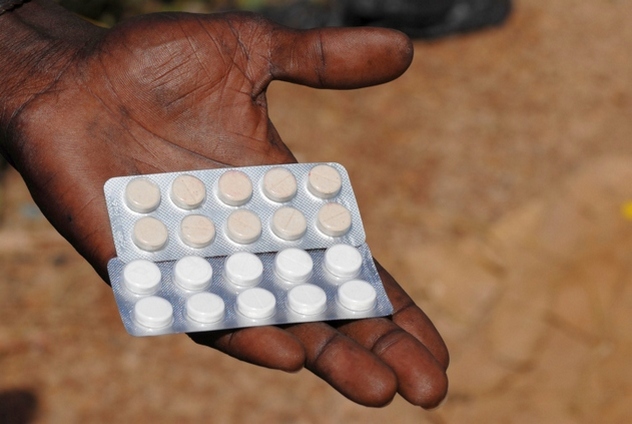 Weird Stuff
Weird Stuff  Weird Stuff
Weird Stuff  Mysteries
Mysteries 10 Tragic Disappearances and Deaths in Joshua Tree National Park
 History
History 10 Ways Childhood Really Sucked in the Old West
 Music
Music 10 Name Origins of Famous Bands from the 1990s
 Religion
Religion 10 Biggest Turnarounds by the Catholic Church
 Weird Stuff
Weird Stuff 10 Unbelievable Times Laws Had Unintended Consequences
 Humans
Humans Ten Historic Women Who Deserve Way More Credit Than They Got
 Movies and TV
Movies and TV 10 Films That Spawned Major Lawsuits
 History
History Ten Times Towns Were Wiped Off the Face of the Earth
 Creepy
Creepy 10 of the Most Disturbingly Haunted Public Houses in the UK
 Weird Stuff
Weird Stuff 10 Niche Subcultures That Are More Popular Than You Might Think
 Mysteries
Mysteries 10 Tragic Disappearances and Deaths in Joshua Tree National Park
 History
History 10 Ways Childhood Really Sucked in the Old West
Who's Behind Listverse?

Jamie Frater
Head Editor
Jamie founded Listverse due to an insatiable desire to share fascinating, obscure, and bizarre facts. He has been a guest speaker on numerous national radio and television stations and is a five time published author.
More About Us Music
Music 10 Name Origins of Famous Bands from the 1990s
 Religion
Religion 10 Biggest Turnarounds by the Catholic Church
 Weird Stuff
Weird Stuff 10 Unbelievable Times Laws Had Unintended Consequences
 Humans
Humans Ten Historic Women Who Deserve Way More Credit Than They Got
 Movies and TV
Movies and TV 10 Films That Spawned Major Lawsuits
 History
History Ten Times Towns Were Wiped Off the Face of the Earth
 Creepy
Creepy 10 of the Most Disturbingly Haunted Public Houses in the UK
10 Depressing Truths About Modern Medicine
We expect our doctors to be competent, ethical, and up to date. What we don’t understand is that these qualities sometimes conflict. For example, does a new surgical technique really work, or does the patient just think it does? The only way to tell is with a clinical trial—somebody is going to secretly get a fake surgery as a test control. Is that ethical?
That’s just one of the many controversies the doctors are hotly debating (out of public sight, for the most part).
10Doctors Can Be Deceived Or Make Mistakes

Medical journals help physicians stay up to date. Unfortunately, they sometimes contain papers written by drug company ghostwriters. For instance: In 2000, a paper in the New England Journal of Medicine praised Vioxx, a new pain reliever. The writers—some of whom later turned out to be connected with the company that made Vioxx—played down cardiac side effects. Does Vioxx sound familiar? It was taken off the market in 2004 for—you guessed it—causing cardiac problems.
Most medical treatment goes through clinical trials to make sure that it works and is safe. However, experts recently went back through some of those studies and found that over a third of them had mistakes. These ranged from relatively small stuff all the way up to recommending treatment for the wrong group of people. And that’s not all. A second look at the studies that led governments to stockpile flu-fighting agents Tamiflu and Relenza showed that these drugs probably aren’t as effective as researchers once believed. They might shorten your bout of flu by half a day, but there’s no evidence that they will prevent complications or keep you out of the hospital.
9Advance Directives Can Let Dementia Patients In For Risky Research

Doctors won’t treat you without your informed consent. So what if you’re unconscious? Hopefully, you’ve filled out an advance directive. You might even have a research advance directive on file, if you don’t mind taking a chance and possibly helping others in the future. It’s pretty basic—unless you come down with dementia.
Alzheimer’s has been studied for over 100 years, but we still don’t know much about it. Research is a priority, and some scientists do it with the help of an advance directive. The special research consent has to be signed before the patient gets dementia, and this doesn’t happen often. Some believe that requiring this consent blocks valuable research. Others aren’t at all comfortable with the idea, and they’ve got a point, too. Terrible things have happened during human experiments.
The Alzheimer’s Association takes the middle ground. They suggest enrolling everybody in research if there’s little risk, obtaining the surrogate’s consent for risky research with potential benefits, and requiring research consent for any risky research without likely benefits.
8Incidental Findings Can Ruin Your Life

Modern medicine has the most powerful tools in history. However, sometimes it’s possible to see too much. Say you go to the ER because you’re feeling depressed, and routine tests show a mass on your adrenal gland. It’s such a common finding, doctors call it “incidentaloma.” These tumors are usually benign, but the doctors won’t know for sure that it’s not cancer unless they do a lot of tests.
Cancer? Do all the tests!
So they do all the tests, and those come back benign, because that’s what incidentalomas usually are. However, now you have huge medical bills and are feeling emotionally overwhelmed, maybe even suicidal. You could just ask the doctor not to tell you about incidental findings. However, if it involves gene sequencing, the doctor might ignore your request. The American College of Medical Genetics and Genomics tells its members to look for unrelated risky genes whenever they do genetic tests and to tell the patient about whatever they find. Medical technology can cause some expensive, heartbreaking problems. Nobody really knows how to handle the problem of incidental findings.
7Unethical Co-Branding

Co-branding can do wonderful things. For example, some credit card companies donate $100 to a medical center if new customers spend $500 within six months of being approved. Businesses, including hospitals, link their names with other companies for greater public visibility. It usually works out well for everybody. However, problems can come up if the hospitals don’t do their homework on potential business partners.
Some genetic screening companies, for example, avoid regulation by describing their tests as “recreational.” Some direct-to-consumer companies that provide cardiac screening are under attack by consumer groups for pushing tests that these groups claim will do more harm than good.
It’s a mixed bag. Even experts who oppose direct marketing to patients have to admit that there’s no solid evidence so far that it’s harmful as an educational tool. Beyond that, there’s a lot of controversy. So don’t automatically assume the name of a respected medical institution on something guarantees it’s just what the doctor ordered—think it through and read the fine print.
6You Could Wake Up During Surgery

As depressing as modern medicine can be, at least there’s anesthesia. Back in the day, surgery on a wide-awake patient was ghastly for everybody. Well, guess what? Today, one or two patients out of 1,000 wake up while they’re being operated on. Not surprisingly, up to 70 percent of them develop PTSD.
It happens when the general anesthesia is too light. The drugs are so powerful, that it’s a fine line between no pain and no vital signs. Anesthesiologists want to keep you alive and comfortable. Sometimes, they just can’t tell how much is enough, especially toward the end of a case, when your body has used up most of the anesthesia. Also, for certain high-risk surgeries, they have to go easy on the gas because you’re already in critical condition.
There can’t be any guarantees that you won’t wake up before they want you to. The good news is that, if you do, you’ll probably feel pressure, not pain. The pressure of instruments and strange hands deep inside your body, moving around—no wonder the PTSD rate is high.
5Doctors May Have Conflicts Of Interest

Everybody munches on freebies at the grocery store. Why shouldn’t doctors get free samples, too? Drug company reps offer them everything, from notepads to free pizza. Of course the physicians take some. Then they go on practicing medicine their own way. Probably. This isn’t a problem in itself—doctors have to eat and doodle just like the rest of us. Conflict of interest only gets serious when money and influence are at stake.
That happens a lot. Researchers say that 40 percent of the drug company directors they studied also held top posts at major academic medical centers. Those directors, on average, got well over $250,000 a year for their services. Then they went back to the medical center and ran its health care, research, and school their own way. Probably.
It also turns out that your medical care may be different—and possibly more expensive—if your doctor owns any labs and equipment or is a partner in a specialty hospital. Federal and state laws restrict self-referrals. In spite of that, it’s been shown that patients have more tests and more surgeries in areas where physicians own a lot of the local medical infrastructure.
4 No One Really Knows What Your Health Care Costs

When medical bills arrive, most people reach for their checkbook or maybe for the phone to call the insurance company (and possibly a bankruptcy lawyer). Would you believe the hospital might back off if you challenge the bill? Or that hospitals charge different prices depending on your insurance? They do this because nobody has a clue how much your visit actually costs. Don’t take our word for it. In 2004, the UC Davis Health System chief financial officer said, “There is no method to this madness. As we went through the years, we had these cockamamie formulas. We multiplied our costs to set our charges.”
Hospitals use a master price list called a “chargemaster.” Except in California, you don’t have the right to see one. Even if you do, it won’t make much sense. There’s no national standard for them, and everybody updates them differently. Your insurance company may get a discount of more than 50 percent off chargemaster prices. Uninsured? You’ll pay the full amount. Obamacare has caused a boom in medical billing specialists. But still no one is sure how to code your medical bill.
3Electronic Health Record Errors

Your medical records were once stored on paper. Doctors and hospitals have saved time, space, and money by switching over to the electronic health records. These wonderful software packages save lives, too, but nothing is perfect. Computer and human errors are also present. Even worse, contracts with the software companies are silencing physicians who want to complain about the software.
Errors are common. Doctors miss important lab results because the screen is badly designed. Medication doses are mixed up. Notes disappear. And no one is tracking these errors. It’s even possible that this has contributed to the US Ebola crisis. Thomas Duncan caught the bug in Liberia. After coming home, he went to a Dallas ER for symptoms that could easily have been something like the flu. He did tell them where he’d been, and a nurse did enter that into his electronic record. What happened next isn’t clear, but it’s possible that the nurse’s note wasn’t immediately available to the ER doctor and other health care providers because of a software design flaw. In any case, they didn’t immediately treat Mr. Duncan for Ebola, and he later died from the disease.
2Hacked Medical Devices

Medical equipment has NSA-level cybersecurity, right? No, not at all. Recently, a Midwestern US health care chain asked the IT department to hack equipment at its 100 facilities. It was horrifyingly easy for them to access medical records, reset medicine pumps, reprogram defibrillators, change refrigerator temperature settings, and to take down emergency and lab equipment. And that’s just what the company would publicly admit. Problems included weak passwords, infected devices, and poor firewalling. However, the system’s best feature—feeding embedded information directly into medical records—also made it a hacker’s dream.
This isn’t a one-off problem. Malware shut down a New Jersey heart catheterization lab in 2010. The Conficker virus was found on 104 devices in a Tampa VA hospital. An antivirus program forced a third of Rhode Island’s hospitals to postpone everything but emergency surgeries and treatment because it mistakenly identified a critical Windows DLL as malicious.
No patients have been harmed yet, fortunately. The FDA just released cybersecurity guidelines. While they’re not federal law, good luck getting your new medical device approved if it’s not secure. And the guidelines are a heads-up to the health care world that now is the time to somehow secure all the vulnerable equipment out there.
1Unfair Treatment Of Minorities Still Exists In The US

Americans once got different medical treatment based on their ethnic background. We’ve come a long way, but not as far as we think. In 2002, the Institute of Medicine found that minorities were routinely given lower-quality health care and denied some drugs and medical procedures. They were also more likely to have an amputation for diabetes. Researchers called for system changes, as well as for more minority providers and more interpreters to overcome language barriers. Six years later, a different group found the same problems. This group put their findings in a book that people could use to improve things in their own communities.
In some ways, people are even worse off in 2014. Doctors say that it’s a very complex problem. Insurance plans and providers don’t serve poor communities. There are also cultural differences, communication barriers, and lack of information on how to access the system.
+Faking Surgery For Science
Unfortunately, our example about secret placebo surgeries isn’t theoretical. It’s rare, but it has happened. In 2009, for example, a report was published in the New England Journal of Medicine that described how 63 patients with compression fractures from osteoporosis got “a simulated procedure without cement” as part of a study. This didn’t just happen at a single hospital, either. Several major medical centers were involved. Well, that sounds horrible, but the study proved that the real surgery probably wasn’t helping anybody. Was it worth it? When it comes to sham surgery, doctors are still trying to make up their minds.
Barb likes to write about science at her blog Flight To Wonder.








